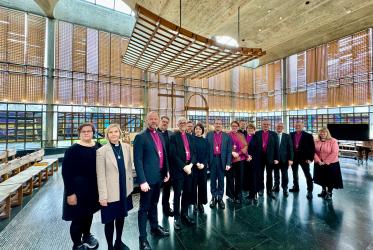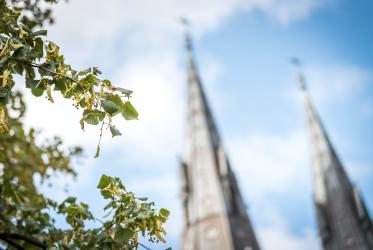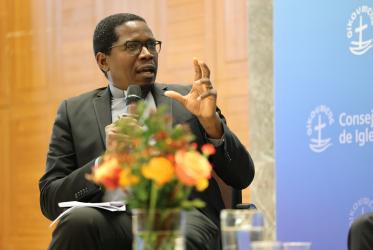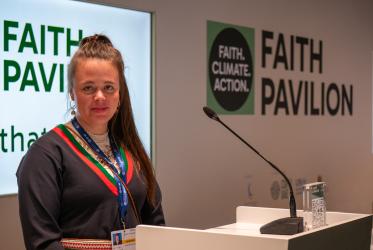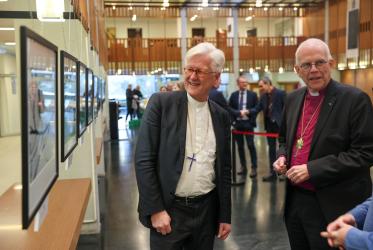Lutheran communication directors and communication officers from the Nordic countries met in Stockholm, Sweden from 26 to 28 August to discuss the role of the church in the civil society in a local, national and global context. It’s exactly 90 years since August 1925 when Nathan Söderblom, Swedish ecumenist and Nobel laureate, organized the First International Conference on Life and Work, an ecumenical gathering in Sweden with participants from all over the world.
This year's Nordic meeting included seminars and workshops with an opening session featuring Marianne Ejdersten, director of Communication at the World Council of Churches (WCC) addressing the theme “Local becomes national becomes global” with participation via Skype from Anna Hjälm, ecumenical officer in Jerusalem with the WCC’s Ecumenical Accompaniment Programme in Palestine Israel and Eva-Maria Reinwald, coordinator for Climate Justice in the Evangelical Church of Westphalia, a regional member church of the Evangelical Church in Germany (EKD).
Ejdersten said in her opening speech: “It’s an honour and pleasure to represent the World Council of Churches in Stockholm today. Söderblom opened a new chapter in the history of the churches and their common witness in the world. He was instrumental in planning the institutional embodiment of the ecumenical movement, which later became the WCC.”
Ejdersten underlined: “The Christian tradition affirms that God invests all of humankind with freedom and dignity, and that God stands especially with the oppressed and marginalized, working through history for their liberation. God desires that all people may be enabled to learn from and interpret their own reality.”
She continued, “This is our ministry to listen, learn, communicate, find strategies and share stories. Communicating about church activities and relations is something above and beyond the ordinary and must be conducted with great respect for the gospel. Let’s be concrete and join the pilgrimage of justice and peace! The 10th Assembly of the WCC in Busan, Korea, in November 2013, called on you and all people of good will.”
The WCC will focus on the work of the pilgrimage during 2016 on the situation in the Middle East, especially Israel and Palestine. Anna Hjälm, ecumenical officer in Jerusalem, reported from the work: “The Ecumenical Accompaniment Programme in Palestine Israel brings internationals to the Holy Land for three months, witness life under occupation, to engage with local Palestinians and with Israeli peace groups, and upon return to their home communities, share their experience in order to engage others in the quest for a just peace and life in dignity and safety for all. Invite them to your community and listen to their first-hand accounts of the life and challenges in Palestine and Israel.”
The main focus for the WCC this year is the climate change and the preparations for the United Nations Climate Change Conference (COP 21) from 30 November to 11 December 2015 in Paris.
Reporting via Skype on advocacy activities in Dortmund and Germany, Reinwald said, “In the view of the EKD, reach a binding agreement on drastically reducing CO2 emissions and assistance for the poorest in the world in coping with the consequences of climate change. On the initiative of the WCC a broad ecumenical alliance from regional churches, dioceses, Christian development services, missions and youth associations will launch a pilgrimage for climate justice in September. With the general theme of "Act now for climate justice" with people from all over Europe, who will conclude their pilgrimage to the climate conference (COP 21) in Paris.”
The Rev. Arni Svanur Danielsson, director of communication in the Evangelical Lutheran Church of Iceland commented on the presentation: “I think the pilgrimage is an important project that can help us to shape and see the impact of religion in the larger society and also influence the way the churches think about themselves. It creates awareness about the important issues we have to deal with in the wider world and encourages us to act. The churches are called to be witnesses to both justice and peace.”
Magdalena Widmark, communication officer in the Church of Sweden said in her response: “We have many big challenges in the north. The largest challenge is perhaps communicating in the truest sense, to build relationship and to be relevant in people’s daily life. We also need to leave our academic language and communicate in word and deed.”
NORDKOM 2015 included also seminars with Erika Brundin, deputy general secretary of the Church of Sweden on “The Church, State and Identity” and a session with the Rev. Kristin Molander, ecumenical officer Church of Sweden, on the Reformations Jubilee and the final session with the Rev. Arni Svanur Danielsson addressing the theme “The Church and Social Media”. NORDKOM2015 was hosted by the Evangelical Lutheran Church of Iceland and the Church of Sweden.
WCC director of communication’s speech at NORDKOM2015
Accompanying slide show: Local becomes national becomes global
WCC Pilgrimage of Justice and Peace
Website of the Ecumenical Accompaniment Programme in Palestine Israel
The Lutheran World Federation - Reformation 2017
WACC Global

